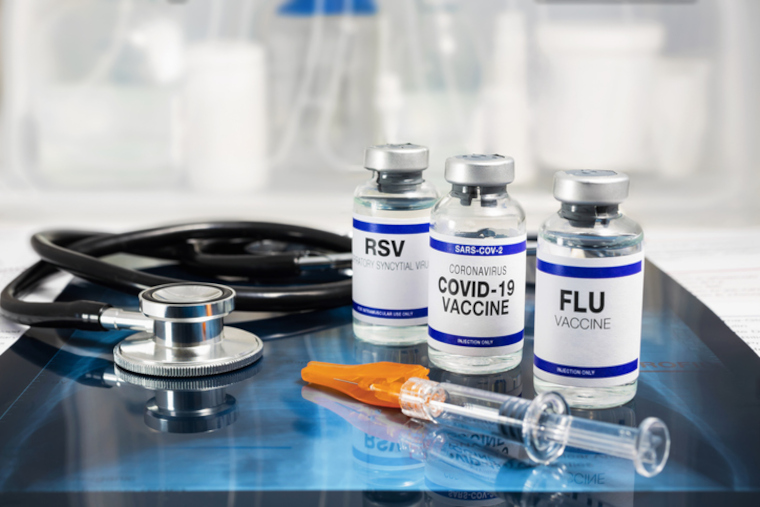By Tanya Terry
Last winter’s “tripledemic” of respiratory viruses had affected at least around 40% of U.S. households according to survey released by the Kaiser Family Foundation early in the year.
It is predicted by the Centers for Disease Control (CDC) there will again be three viruses we Americans should protect ourselves against when cold weather sets in, which the CDC is already preparing for.
Each of the viruses can be fatal.
Tripledemic refers to the belief all three viruses will again surge at the same time.
Respiratory syncytial virus (RSV)
The first is respiratory syncytial virus, or RSV.
Symptoms of RSV can include coughing, runny nose, wheezing, decreased appetite, sneezing or fever.
The CDC website says most people recover from RSV in a week or two. However, the website points out RSV can be serious, especially for infants and older adults.
A new vaccine was recently approved by FDA to protect against respiratory syncytial virus (RSV). RSV vaccine can prevent lower respiratory tract disease caused by respiratory syncytial virus (RSV). CDC recommends adults 60 years and older may receive a single dose of RSV vaccine. RSV vaccine may be given at the same time as other vaccines and should first be discussed with a healthcare provider.
In addition, to prevent the spread of RSV, the CDC suggests covering your coughs and sneezes with a tissue or your shirt sleeve, instead of your hands. Washing your hands with soap and water for at least 20 seconds is also recommended. People trying to prevent RSV spread should avoid close contact, such as in kissing, shaking hands or sharing cups and eating utensils. Cleaning frequently touched surfaces such as doorknobs and mobile devices can also help.
COVID-19
According to the CDC, COVID-19 was the fourth leading cause of death in the U.S. last year. Also, there has been a slight uptick in COVID-19 related visits to the emergency rooms and positive COVID-19 tests recently.
Symptoms of COVID-19 include fever or chills, cough, shortness of breath or difficulty breathing, fatigue, muscle or body aches, headache, new loss of taste or smell, sore throat, congestion or runny nose, nausea or vomiting and diarrhea.
To protect yourself and your loved ones from COVID-19, the CDC first and foremost recommends staying up to date with vaccines to help your body develop protection from the virus that causes COVID-19. This remains especially important for those with weakened immune systems. It is true that vaccinated people can get infected with the virus that causes COVID-19. Still, the CDC continues to recommend that everyone stay up to date on COVID-19 vaccines. Doing so can drastically lower the risk of dying, being hospitalized or getting very sick from COVID-19. Click the link for details on being up to date: https://www.cdc.gov/coronavirus/2019-ncov/vaccines/stay-up-to-date.html
To find a COVID-19 vaccine in your area, visit https://www.vaccines.gov/. Another way to find COVID-19 vaccines is by calling the COVID-19 Hotline at 888-535-6136 between 8 a.m. to 5 p.m., Monday-Friday, or between 10 a.m. to 2 p.m., Saturday and Sunday. When doing so, be sure to press option 1.
Additional preventative measures for COVID-19 include handwashing, improving ventilation, getting tested for COVID-19 if needed, avoiding people who have suspected or confirmed cases of COVID-19, following recommendations for what to do if you have been exposed, staying home if you have suspected or confirmed COVID-19 and seeking treatment if you have COVID-19 and are at high risk for becoming very sick.
Influenza (the flu)
Flu signs and symptoms usually come on suddenly. What some people may not know is that not everyone with the flu will have a fever. Other symptoms of flu can include chills, cough, sore throat, runny or stuffy nose, muscle or body aches, headaches, fatigue and vomiting or diarrehea.
Again as the first and most important step in protecting against flu viruses, the CDC again recommends a yearly flu vaccine. Adults and children 6 months and older should get an annual flu vaccine, ideally by the end of October. It is of extreme importance people at higher risk of developing serious flu complications get vaccinated. High risk groups include include young children, women who are pregnant and people with chronic health conditions like asthma, diabetes or heart and lung disease, in addition to those 65 and older.
Other preventative measures include avoiding close contact with people who are sick, limiting contact with others as much as possible keep from infecting them, covering your nose and mouth with a tissue when you cough or sneeze and throwing the tissue in the trash after using it, frequent and proper handwashing (or using an alcohol-based hand rub is unable) and staying home for at least 24 hours after a fever is gone except to get medical care or other necessities.

